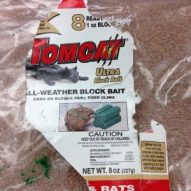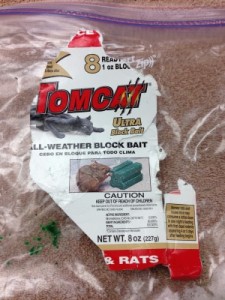EPA and Reckitt Benckiser Inc. Reach Agreement to Cancel Certain Rodenticide Products
Wowza! Reckitt Benckiser, makers of d-CON, just lost their lawsuit against the EPA (or what they called “settles”). The EPA issued a mandate back in July 2011 to remove anticoagulant rodenticides (ACR) off the market, and several large mouse and rat poison companies have fought this.
So what does this late breaking news mean? It means that Reckitt Benckiser has to remove d-CON off the shelves. While this is good for wildlife (who are often poisoned accidentally by these mouse and rat poisons), it’s bad news for dogs and cats (as this is the only mouse and rat poison that has an antidote that is easily treatable).
Unfortunately, this is bad news for veterinarians (and their patients: dogs and cats), as it means we’ll be seeing more bromethalin and cholecalciferol poisoning instead. These two types of mouse and rat poison do NOT have an antidote, and are not treated with Vitamin K1. Bromethalin works by causing cerebral edema (e.g., brain swelling) and results in severe tremors and seizures, while cholecalciferol results in severe hypercalcemia (a high calcium level) and secondary acute kidney failure.
Read more below to find out this big news. Have you seen any bromethalin or cholecalciferol poisoning cases?
Release Date: 05/30/2014
WASHINGTON – The U.S. Environmental Protection Agency (EPA) has reached agreement with Reckitt Benckiser Inc. to cancel 12 d-CON mouse and rat poison products that do not currently comply with EPA safety standards.
“Millions of households use mouse and rat poison products each year. Canceling these products will help prevent risks to children, pets and wildlife,” said Jim Jones, Assistant Administrator for EPA’s Office of Chemical Safety and Pollution Prevention. “This voluntary move will get us far faster results than would otherwise be achieved through an administrative process.”
Before EPA tightened the safety standards for household rat and mouse poison products, more than 10,000 children a year were accidentally exposed. Since the new standard took effect, the number of children exposed has decreased. The agency worked with a number of companies to develop safer mouse and rat poison products that are effective, affordable and widely available.
The cancellation of these 12 d-CON products that do not comply with current standards will continue the trend of reduced exposure to children, pets and wildlife. The company has agreed to stop production by the end of the year and stop distribution to retailers by March 31, 2015. The new standards require consumer mouse and rat poison products to be housed in protective bait stations.
Pellets and other bait forms that cannot be secured in bait stations are prohibited. EPA also prohibits the sale of products containing brodifacoum, bromadiolone, difethialone and difenacoum to residential consumers because of their greater risk to wildlife such as mountain lions, eagles, wolves and foxes.
For more information, visit:
http://www2.epa.gov/rodenticides/canceling-some-d-con-mouse-and-rat-control-products
For a complete list of the homeowner use rat and mouse products that meet EPA’s safety standards, visit:
http://www2.epa.gov/rodenticides/choosing-bait-station-household-use




No Comments
Trackbacks/Pingbacks